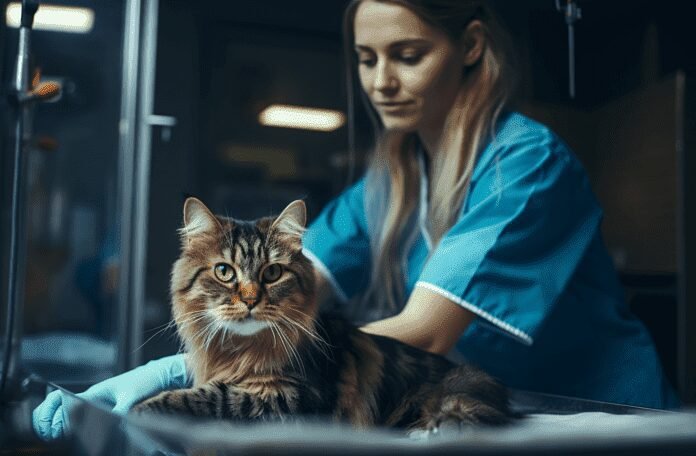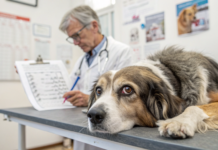Last Updated on September 3, 2024 by Dogs Vets
Understanding the Causes and Treatments of Diarrhea in Cats
Diarrhea is a ubiquitous problem for felines of all ages and may be precipitated by various causes. Subsequently, apprehending the sources and remedies of diarrhea in cats is indispensable to guaranteeing their vigor and contentment.
What is Diarrhea?
Diarrhea is characterized by slimy, liquid excretions more often than standard. It can also be accompanied by abdominal anguish, disgorging, and desiccation.
Though it is regular for felines to have intermittent diarrhea, long-term or persistent diarrhea can indicate an underlying medical problem that should be attended to.
Common Causes of Diarrhea in Cats
There are numerous potential causes of diarrhea in cats, including dietary changes, parasites, infections, medications, allergies, or inflammatory bowel disease (IBD).
Additionally, stress or emotional upset can also cause digestive issues in cats. Therefore, understanding the specific cause of your cat’s symptoms is important to treat their diarrhea effectively.
Dietary Changes: Dietary changes are among the most common causes of cat diarrhea. Feeding your cat unfamiliar foods or switching their diet too quickly may cause digestive upset and lead to loose stools if you change your cat’s diet gradually over several days.
Moreover, providing your feline with a wholesome regimen that fulfills its dietary requirements is essential.
Parasites: Parasites like nematodes, ancylostomiasis, cestodes, and protozoans can also contribute to cat digestive difficulties, including diarrhea. These parasites are generally acquired by contact with other animals or polluted soil.
If you think your cat has been infested with parasites, consulting your veterinarian for diagnosis and potential treatment plans is paramount.
Infections: Bacterial infections like salmonella or Clostridium perfringens may be the underlying cause of diarrhea in cats. Such infections are usually contracted through contaminated sustenance or water sources and may necessitate antibiotics for remediation.
Medications: Medicines such as antibiotics or anti-parasitic drugs may lead to digestive discomforts, including diarrhea as a side effect. If your cat has loose stools after initiating a medication, it is prudent to converse with your veterinarian regarding alternative, more suitable remedies.
Allergies: Allergies can also lead to digestive upset, including diarrhea in cats. Common allergens include certain proteins from food sources and environmental allergens such as pollen or dust mites.
Inflammatory Bowel Disease (IBD): IBD is an inflammatory condition affecting the gastrointestinal tract, leading to chronic digestive issues, including frequent bouts of diarrhea in cats.”
If you speculate your feline has an allergy, you must visit your vet for identification and treatment alternatives, including a removal diet or antihistamines.
Inflammatory Bowel Disease (IBD): IBD is an incendiary affliction influencing the gastrointestinal system, prompting persistent digestive problems, including regular episodes of looseness of the bowels in cats. This condition may require special diets or medications depending on the severity of symptoms and should be discussed with your veterinarian if suspected.
Stress/Emotional Upset: Stressful situations such as moving homes or introducing new pets can also lead to digestive upset, including diarrhea in cats due to the release of hormones associated with fear responses which disrupt normal digestion processes.
Suppose you notice any change in behavior associated with stress-induced reactions.
In such an event, it is requisite to quell their tension points, like affording them snug zones where they sense security or paving the way gradually into foreign settings instead of rashly fluctuating their plan too promptly.
When to Seek Veterinary Care
If your cat experiences persistent diarrhea, especially if it’s accompanied by other symptoms like vomiting, lethargy, or weight loss, it’s essential to consult a veterinarian. They can diagnose the underlying cause and recommend appropriate treatment.
Treatments for Diarrhea in Cats
Treatment for diarrheal episodes will depend on the underlying cause but typically involves dietary adjustments and medications, if necessary, such as antibiotics for bacterial infections or parasite dewormers.
The treatment for diarrhea will depend on the root cause. Here are some common approaches:
- Dietary Changes: If dietary factors are suspected, your vet may recommend a bland diet, such as boiled chicken and rice, to soothe the digestive system.
- Medication: Depending on the cause, your vet may prescribe antibiotics, antiparasitics, or other medications.
- Supplements: Probiotics can help restore healthy gut bacteria and may be recommended.
- Home Remedies: In mild cases, over-the-counter feline digestive aids or gentle home remedies may be helpful.However, it’s always best to consult your vet before trying any home remedies.
Additionally, probiotics may be beneficial for restoring healthy balance within the gut microbiome, while antidiarrheal medications can help reduce symptoms while other treatments are being administered.
In cases where dietary changes or cat food for diarrhea alone are insufficient, additional treatments may involve more invasive procedures such as surgery. Therefore, discussing all treatment options with your veterinarian before proceeding with any procedure is important.
Home Care Tips
In addition to therapeutic approaches, some domestic management regulations may aid in curtailing occurrences of liquid stools.
These encompass portioning nourishment into modest meals during the day instead of one heavy dish; ensuring they have consistent access to pure water; refraining from provisioning uncooked victuals; abstaining from goodies; observing their activity levels; sticking to routine veterinary visits; furnishing a tranquil atmosphere void of agitators; and restraining admittance to the outdoors if feasible.
Conclusion
Diarrhea is a frequent difficulty among cats that manifold alimentative aspects, parasites, contagions, medicaments allergies, IBD, or sentimental shock can begin.
Being aware of the origins and remedy procurable will assist in guaranteeing that your puss receives due meticulousness when experiencing generations of fluid bowels.
Also, effectuating domicile upkeep hints, such as supplying minor aliments throughout the day instead of one heavy meal and access to temperate wet at all spells, will aid in downgrading diarrheal setons.
Important Note: While home remedies can be effective for mild cases, it’s crucial to seek professional advice for persistent or severe diarrhea. A veterinarian can provide a proper diagnosis and ensure your cat receives the appropriate treatment.
Fact Check
We hope you enjoyed reading this article. What are your thoughts on the topic?
“At [Dogsvets.com], our goal is to bring you the most accurate and up-to-date information on all things pet-related.
If you have any additional insights or would like to advertise with us, don’t hesitate to get in touch.
If you notice any errors or discrepancies in our content, please let us know so we can correct them.
We welcome your feedback and encourage you to share this article with others.”























